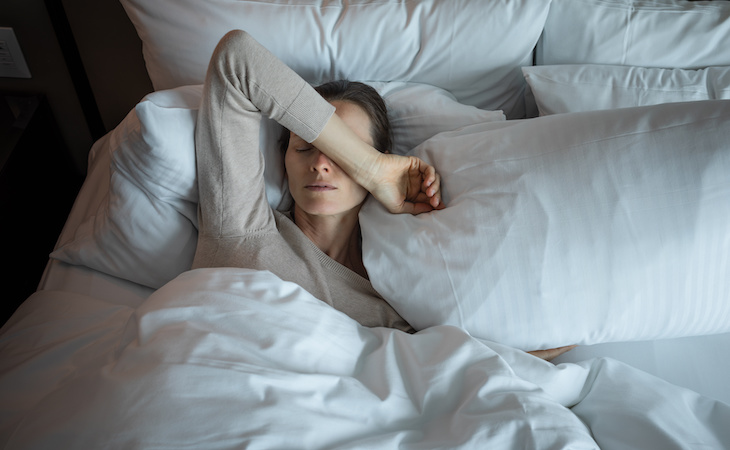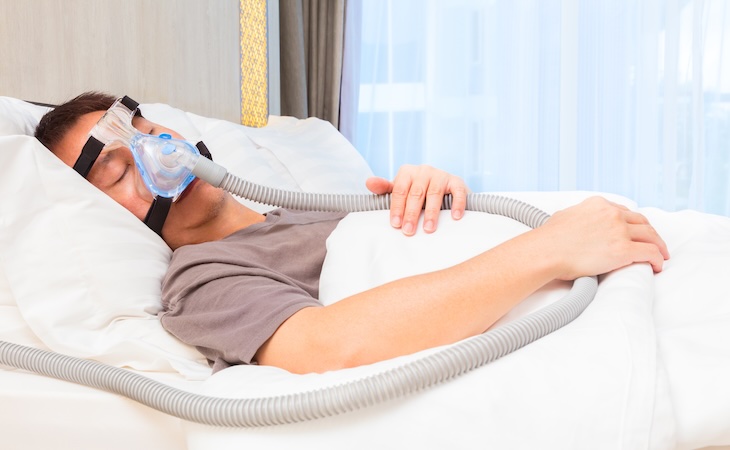Multiple sclerosis (MS) is a chronic autoimmune disease that affects the central nervous system, including the brain, spinal cord, and optic nerves. An estimated one million Americans live with MS. Pain, muscle spasms, fatigue, and other MS symptoms can affect someone’s entire life—including their sleep.
“When someone has multiple sclerosis, their immune system attacks their brain and spinal cord,” says Jacob Hascalovici, MD, PhD, co-founder and chief medical officer of clearing.com. “During these attacks, nerve coatings get damaged and the nerves cannot easily relay messages as well, so the body and brain have trouble communicating.”
Hascalovici adds that the difficulties of dealing with MS and the pain that often goes along with it can be tiring enough on their own—but many of the medications used to treat MS can also make it difficult to get enough sleep.
MS and sleep: What’s the connection?
Hascalovici explains that there may be other factors contributing to the challenge of getting enough sleep while living with MS—including vitamin D deficiency, being sedentary, issues related to muscle function or bladder control, and emotional challenges like the depression that can accompany MS.
Fatigue affects up to 90% of people with MS. Bladder issues are also common. Nocturia, when the need to urinate can wake someone from their sleep, affects as many as half of those with MS. As if these aren’t enough, chronic pain can leave someone only dreaming of a good night’s sleep.
“MS can also disrupt the body’s circadian rhythm, which regulates the sleep-wake cycle, leading to difficulties falling or staying asleep,” says Sean Marchese, RN with The Mesothelioma Center at Asbestos.com. He adds that medications to reduce inflammation during MS flare-ups, such as corticosteroids, can cause insomnia.
“Overall, people with MS often report problems with sleep,” says Marchese, “and addressing these issues may improve the overall quality of life and disease management.”
MS and other conditions that affect sleep
Sleep disturbances are extremely common in people with MS. These include:
- Insomnia
- Narcolepsy
- Restless legs/body syndrome
- Circadian rhythm disorders
- REM sleep behavior disorder
- Sleep-disordered breathing
How to sleep better with MS
Bethany Torkelson, 26, works with Saatva in Nashville, Tenn. Only two years, ago she was diagnosed with MS. Her dad also had been diagnosed with MS around the same age. That’s why she recognized that her symptoms—excessive fatigue, colorblindness in one eye, and numbness on one side of her body—might be MS. Scans and tests confirmed the diagnosis.
Torkelson says she had to learn how to live with MS—including how to be able to get the sleep she needs. Besides a four-hour infusion of medication every six months, Torkelson says, “I still have to be really mindful of what I can and can’t do.” She has had to learn to be aware of and minimize stress. During the summer, she has to avoid excessive heat, which she says can trigger a flare.
The first step to sleeping better with MS, Torkelson says, is being thorough with your doctor about all your symptoms so they can be properly managed.
“I would encourage people with MS to overcommunicate what you’re experiencing with your doctor,” she says. “You might think, ‘rest isn’t my biggest issue because I can’t feel anything on the left side of my body.’ But, especially with just taking care of your body rest-wise, it’s important to communicate that with your physician to make sure that you’re put on a treatment plan for your sleep as well.”
Torkelson recommends communicating with friends and loved ones about your need for rest. “Having a support system that understands when you say no is important as well,” she says, adding, “I’m realizing that the more I stay in tune with what my body needs and give my body what it needs—especially sleep and rest-wise—that frees me up to be able to do more of the things that I want to do.”
Torkelson also offers these tips for sleeping better with MS:
- “Number one,” she says, “invest in a really good mattress.” (Full disclosure: Torkelson says she purchased a Saatva mattress.)
- “Invest in quality products to help you sleep,” such as Torkelson’s Apple Watch that helps track her sleep.
- Have wind-down time and stick to a regular bedtime schedule.
Marchese, meanwhile, suggests these additional tips:
- Create a relaxing sleep environment, such as keeping the room cool, dark, and quiet.
- Stay physically active during the day but avoid exercising close to bedtime.
- Use assistive devices or adaptive equipment to improve comfort and positioning while sleeping.
- Talk with your doctor about medications or therapies that may help with sleep disturbances.
“Sleeping is complex,” adds Hascalovici, “so it may take a number of different solutions working together to help you find better sleep.”
FAQs
Can MS cause sleep problems?
MS symptoms, and the stress and depression that come with them, can have a big impact on sleep. It can be difficult to find a comfortable sleep position because of muscle spasticity, facial pain, or tingling sensations. Poor sleep quality can exacerbate MS symptoms, as well as affect mood and energy.
Do people with multiple sclerosis sleep a lot?
People with MS may be prone to napping during the day due to the fatigue that’s highly common in MS. Emotional changes including stress, anxiety, or depression also can lead to daytime napping. MS patients who have hypersomnia (too much sleep) also may frequently nap during the day no matter how much sleep they get at night.
Why do MS symptoms get worse at night?
Reduced movement, tight muscles, and pain can aggravate spasticity, one of the most common MS symptoms, and make it feel worse at night. MS pain—often described as burning, shooting, searing, or deeply aching—is often worse at night. The silence of nighttime can also magnify the impact of these aches and pains because there’s no distraction.
What sleep problems are associated with MS?
Besides the general discomfort of MS symptoms, people with the condition are more likely to have one or more co-existing sleep disorders. The most common sleep disorders affecting people with MS are insomnia, circadian rhythm sleep disorders, restless legs syndrome, sleep-disordered breathing (sleep apnea is the most common type), narcolepsy, and REM sleep behavior disorder.
Is insomnia keeping you up all night? Check out our guide to dealing with insomnia for tips on falling and staying asleep.




